Elbphilharmonie
The Elbphilharmonie (German pronunciation: [ˈɛlpfɪlhaʁmoˌniː] ⓘ; "Elbe Philharmonic Hall"), popularly nicknamed Elphi,[3][4] is a concert hall in the HafenCity quarter of Hamburg, Germany, on the Grasbrook peninsula of the Elbe River.
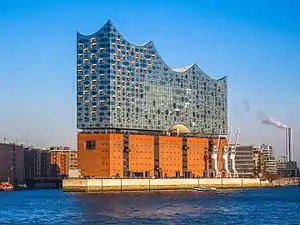 | |
| Address | Platz der Deutschen Einheit 20457 Hamburg, Germany[1] |
|---|---|
| Coordinates | 53°32′29″N 9°59′03″E |
| Public transit | 72 Elbphilharmonie (50 m) |
| Type | Concert hall |
| Capacity | 2,100 (Großer Saal)[2] |
| Construction | |
| Opened | 11 January 2017 |
| Construction cost | 866 million € |
| Architect | Herzog & de Meuron |
| Website | |
| elbphilharmonie.de | |
The new glassy construction resembles a hoisted sail, water wave, iceberg or quartz crystal resting on top of an old brick warehouse (Kaispeicher A, built in 1963) near the historical Speicherstadt. The project is the result of a private initiative by the architect and real estate developer Alexander Gérard and his wife Jana Marko,[5] an art historian, who commissioned the original design by the Swiss architecture firm Herzog & de Meuron,[6][7][2] who developed and promoted the project (since 2003 in cooperation with the Hamburg-based real estate developer and investor Dieter Becken) for 3.5 years until the City of Hamburg decided to develop the project by itself. It is the key project of the new Hafencity development and the tallest inhabited building in Hamburg, with a final height of 108 metres (354 ft).
The Elbphilharmonie was officially inaugurated with concerts of the NDR Elbphilharmonie Orchestra and a light show on 11 January 2017.[8][9][10]
History
On 2 April 2007, the foundation stone was laid in the Kaispeicher A warehouse, in the presence of then First Mayor of Hamburg Ole von Beust, Hochtief Construction AG CEO Henner Mahlstedt, the project coordinator for the City of Hamburg Hartmut Wegener (dismissed in 2008 for mismanagement of the project[11]), Hamburg Minister of Culture Karin von Welck and architect Pierre de Meuron.
In 2007, the construction was scheduled to be finished by 2010 with an estimated cost of €241 million.[12][13] In November 2008, after the original contract was amended, the costs for the project were estimated at €450 million.[14] In August 2012, the costs were re-estimated to be over €500 million, which should also cover the increased cost for a strengthened roof. Construction work officially ended on 31 October 2016 at a cost of €866 million.[15]
The first public test concert at the Elbphilharmonie was held on 25 November 2016.[16][17] The official opening concert took place on 11 January 2017 with a performance by the NDR Elbphilharmonie Orchestra under direction of Thomas Hengelbrock.[18] The first musical selection was "Pan" from Benjamin Britten's Six Metamorphoses after Ovid.[18]
The project was criticized because of its cost and schedule overruns; construction was originally estimated to cost about €200 million, while the final cost was €870 million.[19][20] However, upon completion, Der Spiegel in a comparative analysis suggested that the overrun was relatively "modest" compared to some other international mega-projects.[21]
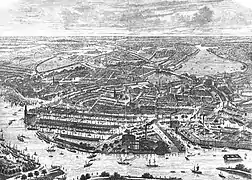 Hamburg aerial view with Kaiserspeicher left-centre, 1882
Hamburg aerial view with Kaiserspeicher left-centre, 1882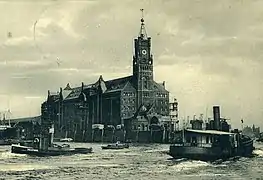 Kaiserspeicher, built 1875, damaged in WW2, demolished 1963
Kaiserspeicher, built 1875, damaged in WW2, demolished 1963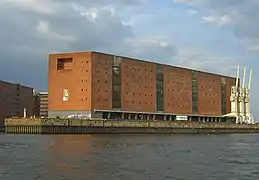 Kaispeicher A by architect Werner Kallmorgen (built 1963) in 2005
Kaispeicher A by architect Werner Kallmorgen (built 1963) in 2005 Elbphilharmonie model
Elbphilharmonie model
Building
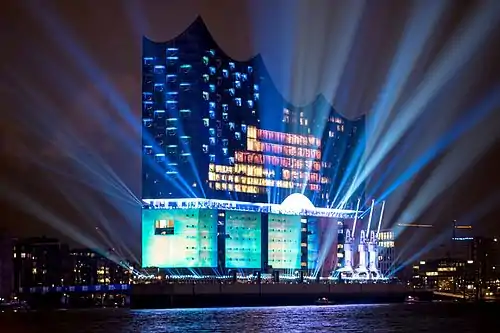
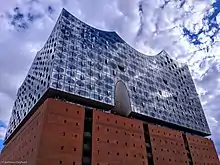
The building is designed as a cultural and residential complex.[2] The original 1966 brick façade of the Kaispeicher A, formerly a warehouse, was retained at the base of the building. On top of this a footprint-matching superstructure rests on its own foundation exhibiting a glassy exterior and a wavy roof line. About one thousand glass windows are curved.[22] The building has 26 floors with the first eight floors within the brick façade. It reaches its highest point with 108 metres (354 ft) at the western side.[2] The footprint of the building measures 120,000 square metres (1.3 million square feet). A curved escalator from the main entrance at the east side connects the ground floor with an observation deck, the Plaza, at the 8th floor, the top of the brick section. The Plaza is accessible by the public. It offers a view of Hamburg and the Elbe. From the Plaza the foyer of the concert hall can be reached.
The Elbphilharmonie has three concert venues. The Great Concert Hall can accommodate 2,100 visitors whereby the performers are in the center of the hall surrounded by the audience in the vineyard style arrangement. The acoustics were designed by Yasuhisa Toyota who installed about 10,000 individually microshaped drywall plates to disperse sound waves.[22] The Great Concert Hall contains a pipe organ with 69 registers built by Klais Orgelbau. The Recital Hall is intended for the performance of recitals, chamber music and jazz concerts; it can hold an audience of 550 people.[2] In addition, there is the Kaistudio that allows for 170 visitors and is intended to serve educational activities.[22] The consultant for the scenography of the concert hall was Ducks Scéno.
The easternmost part of the building is rented by Westin as the Westin Hamburg Hotel that opened on 4 November 2016.[23] The hotel offers 244 rooms between the 9th and 20th floors. The lobby in the 8th floor can be accessed from the Plaza. The upper floors west of the concert hall accommodate 45 luxury apartments. The complex also houses conference rooms, restaurants, bars, and a spa. A parking garage for 433 cars is part of the building complex as well.
Reception
Time placed Elbphilharmonie on its "World's 100 Greatest Places of 2018" list, with Kate Rockwood writing that the acoustics "steal the show" and that the hall's panels provide "a richer, better sound", quoting Toyota who said that the more time performers spend in the hall, "the better their ensemble becomes since they can hear themselves and each other more."[24]
Forbes contributor Jens F. Laurson noted during an initial performance that "Everything musical (and otherwise) going on up and around the hall is beautifully audible down where I sat and, as per other audience member’s accounts, most everywhere else as well", that "[t]he hall is bright, very dry, direct, unforgiving. You can hear everything and immediately, for better and worse" and that "a hall cannot be judged on one or even five hearings, after so little exposure. The orchestra, for one, will get to know their hall much better with time and start to hear not only what they hear ..., but also the audience when and how and where."[25]
Philip Kennicott of The Washington Post wrote "The acoustics, designed by the renowned Japanese acoustician Yasuhisa Toyota, are a marvel of clarity, precision and cool objectivity. ... Toyota doesn’t try to replicate the sumptuous warmth of 19th-century concert halls. Rather, he aims for a live-performance sound adapted to the digital age, which reinforces pleasures lost to an era of cheap headphones and limited-range MP3 files. There is no golden aura, but there is fantastic clarity and spatial presence."[26]
Some complaints about poor acoustics in the hall have been aired. After the grand opening on 11 January 2017, some musicians as well as conductors called the acoustics in the hall "appalling" and "terrible".[27] On the other hand, in a 2019 performance of Mahler's Das Lied von der Erde, audience members shouted, "can't hear you" at tenor Jonas Kaufmann,[28] who himself later complained, "This hall does not help...".[29]
Public transport
The nearest rail station is Baumwall on Hamburg Metro line 3, about 450 metres (1,480 ft) away. The nearest bus stop is Am Kaiserkai, 150 metres (490 ft) away.
Ferry services
Elbphilharmonie is the name of a ferry pier, reachable from Hamburg's St. Pauli Piers.
| Preceding station | HADAG | Following station | ||
|---|---|---|---|---|
| Arningstraße towards St. Pauli (Landungsbrücken) |
72 | Terminus | ||
| St. Pauli (Landungsbrücken) Terminus |
Elb-Hüpfer weekend service only |
Willkomm-Höft (Wendel) One-way operation | ||
| Speicherstadt toward St. Pauli (Landungsbrücken) |
Maritime Circle Line | HafenCity (Elbarkaden) One-way operation | ||
Gallery
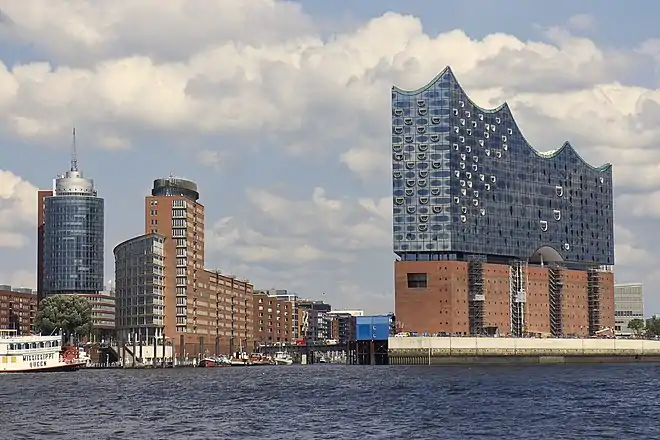
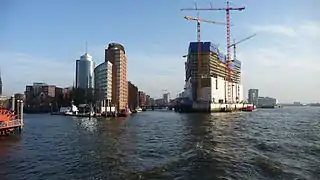 Elbphilharmonie construction in December 2009
Elbphilharmonie construction in December 2009 Aerial view, September 2010
Aerial view, September 2010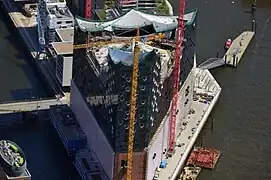 Aerial view with ferry pier in the top right corner, May 2013
Aerial view with ferry pier in the top right corner, May 2013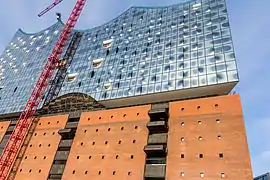 Closeup of the facade, February 2015
Closeup of the facade, February 2015_--_2016_--_3171.jpg.webp) Gustaf Adolfs Church and the Elbphilharmonie, June 2016
Gustaf Adolfs Church and the Elbphilharmonie, June 2016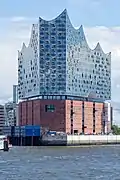 Elbphilharmonie, August 2016
Elbphilharmonie, August 2016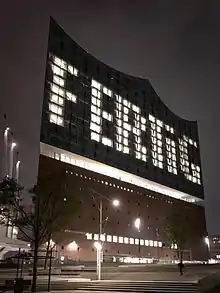 Blinkenlights-like "Fertig" ("finished") message, construction completed 31 October 2016
Blinkenlights-like "Fertig" ("finished") message, construction completed 31 October 2016 Detail of the roof construction
Detail of the roof construction
References
- "Visitor Information". Official Website. Retrieved 28 January 2017.
- "230 – Elbphilharmonie Hamburg". Herzog & de Meuron. 2016. Retrieved 13 January 2017.
- "Elphi entern". Baunetz Media GmbH. 28 May 2010. Retrieved 11 March 2017.; "Stars kommen zu "Elphi"-Konzerten". Welt. 15 April 2013. Retrieved 11 March 2017.
- Mega, Voula P. (29 August 2018). Eco-Responsible Cities and the Global Ocean. Springer. p. 77. ISBN 9783319936802.
- Joachim Mischke/Michael Zapf: „Elbphilharmonie Hamburg“, Edel Books Hamburg, 2016, pages 46–65
- Staff (5 April 2007), River Tunes: Elbe Philharmonic Hall by Herzog & de Meuron, ArchNewsNow, retrieved 23 August 2008
- Jaeger, Falk (May 2008), Waterfront Living and Working: Hamburg's HafenCity, Goethe-Institut, archived from the original on 2 June 2008, retrieved 23 August 2008
- "Elbphilharmonie Opening: NDR Elbphilharmonie Orchester". Official Website. Retrieved 11 January 2017.
- Fonseca-Wollheim, Corinna da (10 January 2017). "Finally, a Debut for the Elbphilharmonie Hall in Hamburg". The New York Times. Retrieved 11 January 2017.
- "Germans cheer new landmark as Hamburg concert hall opens". Reuters. 11 January 2017. Retrieved 11 January 2017.
- Meyer, Peter Ulrich (18 September 2008). "Elbphilharmonie: Beust feuert seinen Chef-Manager". www.abendblatt.de.
- "Start für Entkernung der Elbphilharmonie" (in German). Die Welt. 5 August 2007. Retrieved 13 October 2008.
- "Hamburgs Wahrzeichen wird gebaut" (in German). Die Welt. 7 April 2007. Retrieved 13 October 2008.
- Mischke, Joachim (27 November 2008), "Preis des Prestigeprojekts steigt weiter", Hamburger Abendblatt (in German), retrieved 12 March 2009
- Opening concert for Elphi on 11/12 January 2017, web.de
- Hillers, Holger (6 December 2016). "Geht rein und hört selbst!". abendblatt.de. Hamburger Abendblatt. Retrieved 12 December 2016.
Als einer von rund 1400 Zuschauern hatte ich das große Glück, beim ersten öffentlichen (Test-)Konzert im großen Saal der Elbphilharmonie am 25.11. dabei gewesen zu sein. Der Hamburger Sängerin Miu und ihrer neunköpfigen Band gebührte die Ehre, als erste Künstlerin vor Publikum die Elbphi ihrer musikalischen Jungfräulichkeit zu berauben.
- "Miu in der Elbphilharmonie – Dependent Lady". YouTube. 10 January 2017. Retrieved 10 September 2020.
- "Eröffnung der Elbphilharmonie "Ein Juwel der Kulturnation Deutschland"" (in German). Der Spiegel. 11 January 2017. Retrieved 11 January 2017.
- Schwarz, Reinhard (31 May 2010). "Elbphilharmonie mit Dissonanzen" (in German). Neues Deutschland. Retrieved 12 January 2017.
- Maak, Niklas (14 February 2015). "Der grosse Eisberg über der Stadt" (in German). Frankfurter Allgemeine Zeitung. Retrieved 12 January 2017.
- "Fast schon bescheiden" (in German). Der Spiegel. 11 January 2017. Retrieved 12 January 2017.
- "The Halls – Elbphilharmonie". www.elbphilharmonie.de.
- "Starwood Hotels & Resorts". Retrieved 12 January 2017.
- "Elbphilharmonie: The World's 100 Greatest Places of 2018". Time. Retrieved 14 October 2023.
- Jens F. Laurson. "Review: Hamburg Elbphilharmonie Opening And First Impressions Of The Great Hall." Forbes. 8 February 2017. Retrieved 5 October 2022.
- Kennicott, Philip (15 May 2017). "A new concert hall in Hamburg transforms the city". The Washington Post.
- Kesting, Jürgen. "Akustikprobleme im Konzertsaal: Ist die Elbphilharmonie noch zu retten?". FAZ.NET (in German). ISSN 0174-4909. Retrieved 31 January 2021.
- Joachim Mischke. "Jonas Kaufmann sang, einige Zuschauer störten." Hamburger Abendblatt. 13 January 2019. Retrieved 5 October 2022.
- Joachim Mischke. "Nie wieder Elbphilharmonie? Jonas Kaufmann kritisiert Klang." Hamburger Abendblatt. 19 March 2019. Retrieved 5 October 2022.
External links
- Official website
- Picture of the Elbe Philharmonic Hall
- Live Webcam showing the Elbphilharmonie
- Elbphilharmonie Sessions, a live concert of techno marching band MEUTE on the rooftop, with aerial views of the building, 2021 [39:27]